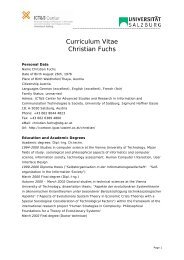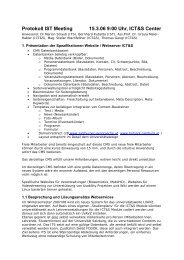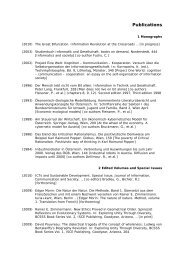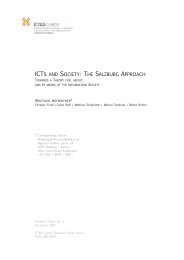CHRISTIAN FUCHS - ICT&S - Universität Salzburg
CHRISTIAN FUCHS - ICT&S - Universität Salzburg
CHRISTIAN FUCHS - ICT&S - Universität Salzburg
You also want an ePaper? Increase the reach of your titles
YUMPU automatically turns print PDFs into web optimized ePapers that Google loves.
Christian Fuchs: Social Networking Sites and the Surveillance SocietyAs long as ISNS are objects of capital accumulation, users will witness how their dataare collected, analyzed, statistically evaluated, and sold as commodities. CommercialISNS are profit-oriented and therefore aim at gathering as much personal data aspossible in order to sell it to third parties that advertise on the platform so that profit canbe generated. The real threat is that ISNS users become objects of state surveillancebecause providers pass on their data to the police or the secret service and objects ofeconomic surveillance that drives capital accumulation. Given the current societalframework, these processes are almost inevitable. The real threats are corporateinterests and state surveillance. The problem is not the individual behaviour of youngpeople. If we want to protect them, then we need to change society. The crucial pointhere is that no matter if users set their profiles to visible or invisible, commercial ISNSwill always pass on the data to the state as long as there are interests in establishing a"surveillance society", and to other companies and advertisers, as long as they have aprofit interest. Therefore the only solution to privacy threats is to overcome newimperialism, surveillance society, and capitalism. If research just focuses on issues suchas individual privacy settings and how they can be adjusted, or individualempowerment, then one neglects these issues and therefore conducts uncriticalresearch.Critical research sees the relationship of society and technology as dialectical, i.e. as aprocess of mutual shaping (Fuchs 2008). Technological determinism is “the idea thattechnology develops as the sole result of an internally dynamic, and then, unmediatedby any other influence, molds society to fit its pattern” (Winner 1980/1999: 29). Bothtechno-optimism and techno-pessimism are forms of technological determinism. Incontrast, dialectical analyses of technology and society constitute a form of realism,they identify contradicting forces and potentials and show how these contradictionsexactly take form, and to which extent each dialectical pole is developed (Fuchs 2008).4. The Societal Context of Integrated Social Networking Sites (ISNS): Political andEconomic Electronic SurveillanceSurveillance means that someone “is seen, but he does not see; he is the object ofinformation, never a subject in communication” (Foucault 1977: 200). Surveillance is apower that is “capable of making all visible, as long as it […] [can] itself remaininvisible” (Foucault 1977: 214). Foucault considers contemporary society as society ofsurveillance and as disciplinary society. He makes clear that surveillance is a repressive,coercive process:“Our society is one not of spectacle, but of surveillance. (…) the individual iscarefully fabricated in it, according to a whole technique of forces and bodies”(Foucault 1977: 217).For Giddens, surveillance means the accumulation of information defined as symbolicmaterials that can be stored by an agency or collectivity as well as the supervision ofthe activities of subordinates by their superiors within any collectivity (Giddens 1981:169). The modern nation state would from its beginning have been an informationsociety because it would collect and store information on citizens (births, marriages,deaths, demographic and fiscal statistics, ‘moral statistics’ relating to suicide, divorce,delinquency, etc.) in order to organize administration.22









